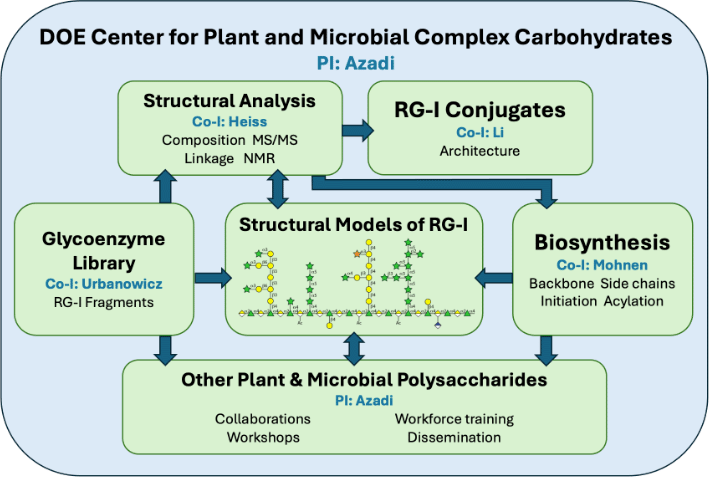DOE Center for Plant and Microbial Complex Carbohydrates

Welcome to the DOE Center for Plant and Microbial Complex Carbohydrates at the Complex Carbohydrate Research Center (CCRC) of the University of Georgia!
We are thrilled to have you visit our website and explore the exciting world of complex carbohydrate research. Our center is dedicated to advancing the understanding of plant and microbial carbohydrates, with a focus on the structure, biosynthesis, and function of rhamnogalacturonan-I (RG-I). Through innovative research and collaboration, we aim to contribute to advancements in bioenergy, agriculture, biotechnology, and more.
At the DOE Center, we are committed to fostering a supportive and collaborative environment for scientists, educators, and innovators. Whether you are a researcher seeking collaborations, a student interested in learning more about carbohydrate science, or a professional looking for innovative solutions, we are here to help.
Thank you for visiting our website. We invite you to explore our research, publications, outreach programs, and more. If you have any questions or need further information, please do not hesitate to contact us.
Welcome to the future of carbohydrate research!
Warm regards,
The DOE Center for Plant and Microbial Complex Carbohydrates Team
The DOE Center for Plant and Microbial Complex Carbohydrates at the University of Georgia is dedicated to advancing the understanding of complex carbohydrates in plants and microbes. Our research focuses on the structure, biosynthesis, and function of rhamnogalacturonan-I (RG-I), a crucial and complex plant polysaccharide. By developing innovative methods and tools, we aim to unravel the intricate details of RG-I and its role in plant cell walls, contributing to advancements in bioenergy, agriculture, and biotechnology.
The mission of the DOE Center for Plant and Microbial Complex Carbohydrates at the Complex Carbohydrate Research Center (CCRC) is to advance the understanding of complex carbohydrates in plants and microbes. The center is dedicated to developing innovative methods for investigating the structure, biosynthesis, and function of rhamnogalacturonan-I (RG-I), a highly complex and economically important plant polysaccharide.
The primary goals of the DOE Center include:
- Understanding Plant Cell Wall Polymers: The center aims to elucidate the structure, biosynthesis, and function of plant cell wall polymers, particularly those containing pectic glycans.
- Improving Plant Growth and Development: By modifying the structure and synthesis of plant cell walls, the center seeks to enhance plant growth and development.
- Bioenergy and Bioproducts: The Center focuses on improving the use and conversion of plant cell wall biomass into biofuels and bioproducts, contributing to sustainable energy solutions.
- National Resource: Serving as a national resource, the center provides structural analysis, expert consultation, and training to scientists from academia, government, and industry.
These goals reflect the Center’s commitment to advancing scientific knowledge and fostering innovation in the field of complex carbohydrates.
The DOE Center for Plant and Microbial Complex Carbohydrates at the Complex Carbohydrate Research Center (CCRC) at the University of Georgia plays a pivotal role in advancing the understanding of complex carbohydrates in plants and microbes. Here are some key aspects of its significance:
The center is devoted to developing methods for investigating the structure, biosynthesis, and function of rhamnogalacturonan-I (RG-I), a highly complex and economically important plant polysaccharide. This research is crucial for understanding the intricate details of plant cell walls, which has broad implications for bioenergy, agriculture, and biotechnology.
The DOE Center serves as a national resource for scientists from academia, government, and industry. It provides collaborative analyses, expert consultation, and training, making it a hub for carbohydrate research. Scientists from U.S. and international biotechnology companies, universities, and government agencies send carbohydrate samples to the center for characterization and structural analysis using the latest technologies.
The Center fosters collaborations with other research institutions and industry partners. These partnerships leverage multidisciplinary expertise and resources to address key scientific challenges. By working together, the Center and its collaborators can advance the understanding of plant and microbial carbohydrates and develop innovative solutions for bioenergy, agriculture, and biotechnology.
The Center is committed to sharing its knowledge and expertise with the broader community through educational workshops, public lectures, and training programs. These initiatives aim to inspire the next generation of scientists and innovators, promoting the importance of complex carbohydrate research.
One of the Center’s primary goals is to improve the use and conversion of plant cell wall biomass into biofuels and bioproducts. This research is essential for developing sustainable energy solutions and addressing global challenges related to renewable energy.
The DOE Center for Plant and Microbial Complex Carbohydrates is a leader in carbohydrate research, making significant contributions to science and industry. Its work is essential for advancing plant science, carbohydrate science, and bioenergy, and it continues to inspire and support researchers worldwide.
The DOE Center for Plant and Microbial Complex Carbohydrates was established in 1986. It is part of the Complex Carbohydrate Research Center (CCRC) at the University of Georgia, which was founded in 1985 to address the national need for a dedicated center focused on the structures and functions of complex carbohydrates.
The Complex Carbohydrate Research Center (CCRC) at the University of Georgia was established in September 1985 to address the national need for a dedicated center focused on the structures and functions of complex carbohydrates. Recognizing the critical roles these molecules play in biological recognition, cellular communication, gene expression, immunology, and more, the CCRC was founded to advance research in this underfunded area.
The University of Georgia recruited Peter Albersheim and Alan Darvill, along with their 14-member research team from the University of Colorado, to establish the CCRC. Initially, the team occupied laboratory and office space in the USDA’s Richard B. Russell Agricultural Research Center. By the summer of 1989, the CCRC moved to its own newly-constructed 40,000 sq. ft. building.
Over the years, the CCRC expanded significantly. In 1990, a 5,000 sq. ft. wing was added to house computer facilities and a 600-MHz nuclear magnetic resonance (NMR) spectrometer. This was followed by a 36,000 sq. ft. addition in 1997 to accommodate new laboratories. In 2003, the CCRC completed construction on a three-story, 140,000 sq. ft. facility, positioning itself as a leader in medical glycobiology and glycotechnology.
The DOE Center for Plant and Microbial Complex Carbohydrates, part of the CCRC, is specifically focused on developing methods to investigate the structure, biosynthesis, and function of rhamnogalacturonan-I (RG-I), a complex and economically important plant polysaccharide.
